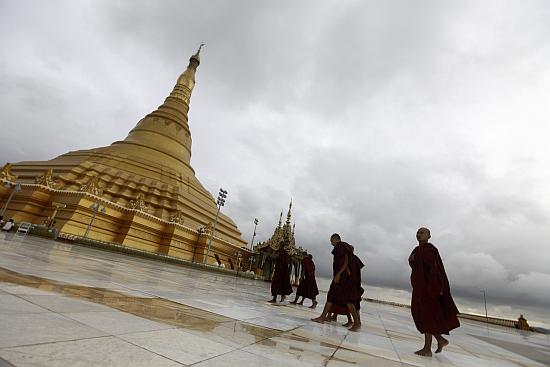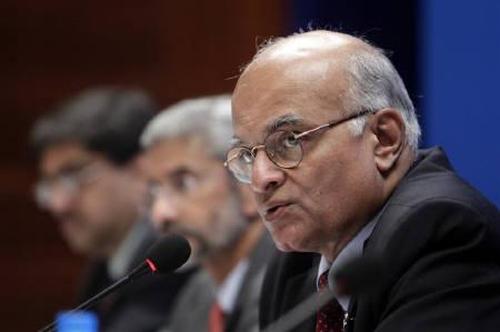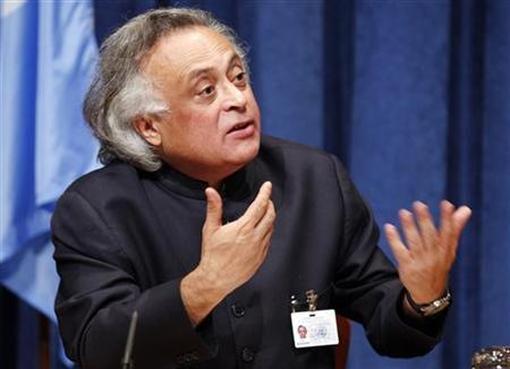Photographs: Siphiwe Sibeko/Reuters Mihir S Sharma
Like China, Indian companies are adopting ruthless and corrupt practises while doing business in developing nations.
Last week, an African farmers' advocate and India's national security advisor both spoke, and they both implied the same thing.
They spoke of two completely different things, one micro and one macro; but both underlined the same sad fact: that India, as it rises, is unable to carve out its own, unique path to deal with the world. It is blindly following China's.
First, the African activist. Nyikaw Ochalla told this newspaper that Indian companies in Ethopia are ganging up with an undemocratic government to displace thousands of farmers from their land.
The deals are apparently difficult to trace, conducted with no transparency whatsoever. Mr Ochalla is not reported as saying so, but most readers will have assumed that money changed hands.
So what's new, you ask? After all, isn't that how Indian companies behave in India? Is India not merely exporting its brand of capitalism to the world? To an extent, that's precisely what's happening.
But note the crucial difference: as Mr Ochalla pointed out, the Ethiopian government may not satisfy our notions of democracy, with the checks and balances that implies.
And so what, many will say - after all, can India just sit back and watch Chinese companies, with all the awesome levers of their competent, ruthless state behind them, take the lead in Africa?
No; but the path ahead must be to stake out a more sustainable strategy than partnering with repressive governments. Unless we believe, as China does, that repression is forever.
...
Complete coverage: Union Budget 2013-14
How India is exporting its corruption to other nations
Image: Buddhist monks visit the Uppatasanti pagoda in Myanmar. As the country moves away from authoritarian rule it may not give preference Indian companies.Photographs: Soe Zeya Tun/Reuters
Consider some other instance of India's engagement with the world. For example, the simple fact that, given its fear of Chinese domination of Myanmar, it essentially stopped speaking for the Burmese pro-democracy movement for years.
Now that Myanmar is moving away from authoritarian rule, will India, Indian investment, Indian companies be given the preference that they otherwise would have?
No. Have we learned a lesson from this? No. Instead, we puffed up in petty postcolonial anger when Barack Obama told our Parliament, with complete truth, that India should have supported democracy in Myanmar more actively.
Elsewhere, too, in Libya, in Iraq, India has been behind the democratic curve.
Meanwhile, Indian companies, like Jindal Steel in Bolivia, export the worst facets of Indian capitalism.
And when others, like GMR in the Maldives, fall afoul of the sort of political checks and balances that they also try to evade at home, the Indian government is expected to step in and defend their interests.
How and why, precisely, will we be trusted across the developing world?
Some will argue that trust doesn't matter. What matters is the ability to do business, with your home government's power behind you to press home a contract or two if necessary.
Yet the truth is that China is out searching for exactly the same resources - agricultural land, iron ore, copper - and business opportunities as Indian companies are.
...
Complete coverage: Union Budget 2013-14
How India is exporting its corruption to other nations
Image: National Security Advisor Shiv Shankar Menon.Photographs: Jason Lee/Reuters
For every dollar Indians can put in as a bribe, the Chinese can put in three. For every lever the Indian government can use, the Chinese can use six. Fight on that ground, and India will lose doubly.
India and Indian companies must define themselves differently, if they are to stake out even the slightest space for their interests.
India has to make the same bet abroad that it has made at home - a bet on democracy and capitalism relatively free of the state, a bet that institutions will firm up and control excessive corruption, a bet that money can still be made, interests can still be protected, once that's done. Anything less is asking to lose.
But there's little enough hope that Indian capital is receiving the right signals - because few in New Delhi seem to have the strategic vision to set India apart from China in the eyes of the world.
That's where the speech last week of India's national security advisor, Shivshankar Menon, at the Munich Security Conference comes in.
It's revealing of India's unwillingness to dehyphenate itself from China even at the highest levels.
Even the headline phrase spoke of this eagerness to stand shoulder to shoulder with our northern neighbour against the Arrogance of the West - "re-emerging powers", Mr Menon said, was a "less condescending" way to describe such nations as India and China.
...
Complete coverage: Union Budget 2013-14
How India is exporting its corruption to other nations
Image: India mimics China while framing its policies.Photographs: Reuters
This, even while admitting it fit China's view of its historical destiny and past, and not India's somewhat less exalted conception of its own.
Mr Menon, sadly for a man who is otherwise so forward-looking, has in several speeches recently shown that many in the Indian policy-making elite are simply unable to move beyond a particular sort of legacy of non-alignment, a perversion of the original Nehruvian idea of free India as an example.
And that's the desire to keep the developing world as it is. To deal with dictators, rather than be seen as a disruptive force for change.
Mr Menon will have dismayed many Indian liberals and democrats by going so far as to say this is the essential commonality between India and China: "Their hierarchical or relativistic strategic cultures are non-proselytising and realist. Their expectations of others are low, and they have historically shown little inclination to improve, convert or democratise others."
Mr Menon, realism is a good thing. But this is not realism. This is mimicry.
We are a nation of policy mimics; if we cannot mimic the West - and how can we, they colonised us and are declining, besides - we must mimic the Chinese.
This government has done more than any to end India's fear of the United States and Europe, but elements within it either lack the imagination to change or are unwilling to do so.
...
Complete coverage: Union Budget 2013-14
How India is exporting its corruption to other nations
Image: Rural Development Minister Jairam Ramesh.Photographs: Jessica Rinaldi/Reuters
India continues to pathetically line up behind China at multilateral negotiations of one sort or another, even when it helps us not at all.
At the big Copenhagen climate summit, then environment minister Jairam Ramesh threw India's weight behind China, and allowed them to stall a deal although India's per capita emissions are a tiny fraction of China's, and we should instead have insisted they followed the same rules as the West.
The Doha round remains deadlocked, with China holding the key to the impasse - but it is not isolated, as India still imagines it has common ground with a "fellow developing nation", sorry, fellow "re-emerging power".
India and China are competitors, not fellow travellers. This competition can be cordial, even friendly, but it is a fact.
Our companies are competing across Africa and South America. Our interests in trade and climate negotiations are orthogonal.
Yet the desire to somehow be bracketed with our more successful neighbour overwhelms this basic reality.
Instead of chasing this will-o'-the-wisp of solidarity, India needs to stand genuinely alone. Its history separates it from the West, its present from China.
Its companies need to behave like those from a liberal, democratic nation, not a corrupt state-capitalist one, and its foreign policy makers need to recognise that "indigenous strategy" means more than simply "different from the West's".







article